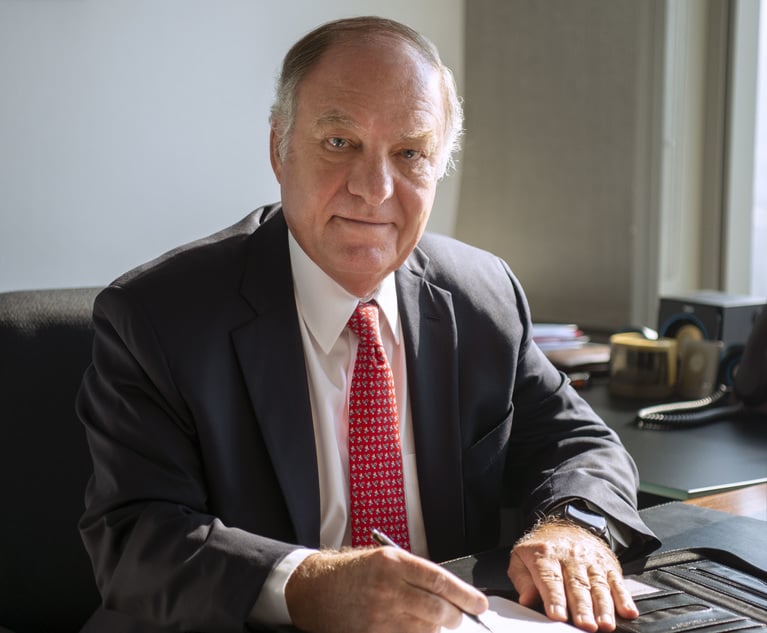White collar crime lawyers on alert as SFO break-up threat recedes
White collar crime advisers are scrambling to divine the direction of corporate crime policy amid mounting expectations that the Government will abandon controversial plans to break up the Serious Fraud Office (SFO). The coalition Government had planned to split the SFO's prosecution division from its investigation function - a move strongly opposed by the agency and many white collar crime specialists.
June 01, 2011 at 07:41 AM
3 minute read
White collar crime advisers are scrambling to divine the direction of corporate crime policy amid mounting expectations that the Government will abandon controversial plans to break up the Serious Fraud Office (SFO).
The coalition Government had planned to split the SFO's prosecution division from its investigation function – a move strongly opposed by the agency and many white collar crime specialists.
However, recent weeks have fuelled mounting expectations that Home Secretary Theresa May (pictured) has abandoned the move amid opposition from cabinet ministers and white collar crime specialists.
May also appeared to row back from plans to break up SFO in a newspaper interview last week, citing "some reservations" about the move, though it remains unclear whether a decision has been abandoned entirely or postponed.
One former SFO official told Legal Week that the agency was now "back to square one". He added: "Instead of creating a single FBI-style body, [the Government] has depleted the capability of the SFO and injured the credibility of senior Government ministers."
Government policy on financial regulation and combating financial crime has gone through a period of sustained upheaval over the last 12 months. Last summer Chancellor George Osborne unveiled plans to create an Economic Crime Agency, which at one point looked likely to encompass the enforcement divisions of the SFO, the Financial Services Authority (FSA) and the Office of Fair Trading (OFT).
However, it was confirmed last autumn that the reformed version of the FSA will retain its enforcement powers, while the Government has since backed away from plans to transfer the OFT's investigatory powers.
Breaking up the SFO would have been a major policy reversal in tackling complex fraud via combined investigations and prosecution – a model imported from the US.
The split, which would have seen the body's prosecution function switch to the Crown Prosecution Service, was also strongly resisted by the SFO and has contributed to a wave of departures from the 300-strong agency.
It remains unclear how the Government intends to proceed with plans for the creation of an FBI-style National Crime Agency (NCA), which at one point looked set to have housed the new anti-fraud body.
Confusion over the direction of white collar crime policy has been strongly criticised by the legal profession – particularly as the SFO is currently charged with implementing enforcement and prosecutions under the Bribery Act.
Linklaters litigation partner and bribery specialist Satindar Dogra commented: "The proposal to split the investigative and prosecuting powers of the SFO has caused a fair amount of concern. A split would be inefficient and would call into question the reliance placed on guidance given by the SFO on important issues, such as self-reporting and the Bribery Act. If the government is indeed now backing away, that is to be welcomed and it may also help with the haemorrhaging of senior staff at the SFO."
Another City litigator commented: "It is time to be extremely critical as to why the Government backed out of creating a super economic agency from the SFO, the FSA enforcement side and the OFT with new powers and the ability to fund itself according to need. So far we have nothing but chaos."
- Click here for Legal Week's in depth feature on financial regulation.
This content has been archived. It is available through our partners, LexisNexis® and Bloomberg Law.
To view this content, please continue to their sites.
Not a Lexis Subscriber?
Subscribe Now
Not a Bloomberg Law Subscriber?
Subscribe Now
NOT FOR REPRINT
© 2025 ALM Global, LLC, All Rights Reserved. Request academic re-use from www.copyright.com. All other uses, submit a request to [email protected]. For more information visit Asset & Logo Licensing.
You Might Like
View All
Carey Abogados’ Senior Partner Becomes New Head of IBA, First Chilean to Assume Role of President

Goodwin Hires Quinn Emanuel Antitrust Partner to Launch Brussels Office
3 minute read
Claus von Wobeser: Mexico's ‘Godfather of Arbitration’ Becomes Firm’s Honorary Chair

Jenner & Block Expands London Team with Baker McKenzie Hire to Lead New Practice Area
2 minute readTrending Stories
- 1Texas Supreme Court Grapples Over Fifth Circuit Question on State Usury Law
- 2Exploring the Opportunities and Risks for Generative AI and Corporate Databases: An Introduction
- 3Farella Elevates First Female Firmwide Managing Partners
- 4Family Court 2024 Roundup: Part I
- 5In-House Lawyers Are Focused on Employment and Cybersecurity Disputes, But Looking Out for Conflict Over AI
Who Got The Work
J. Brugh Lower of Gibbons has entered an appearance for industrial equipment supplier Devco Corporation in a pending trademark infringement lawsuit. The suit, accusing the defendant of selling knock-off Graco products, was filed Dec. 18 in New Jersey District Court by Rivkin Radler on behalf of Graco Inc. and Graco Minnesota. The case, assigned to U.S. District Judge Zahid N. Quraishi, is 3:24-cv-11294, Graco Inc. et al v. Devco Corporation.
Who Got The Work
Rebecca Maller-Stein and Kent A. Yalowitz of Arnold & Porter Kaye Scholer have entered their appearances for Hanaco Venture Capital and its executives, Lior Prosor and David Frankel, in a pending securities lawsuit. The action, filed on Dec. 24 in New York Southern District Court by Zell, Aron & Co. on behalf of Goldeneye Advisors, accuses the defendants of negligently and fraudulently managing the plaintiff's $1 million investment. The case, assigned to U.S. District Judge Vernon S. Broderick, is 1:24-cv-09918, Goldeneye Advisors, LLC v. Hanaco Venture Capital, Ltd. et al.
Who Got The Work
Attorneys from A&O Shearman has stepped in as defense counsel for Toronto-Dominion Bank and other defendants in a pending securities class action. The suit, filed Dec. 11 in New York Southern District Court by Bleichmar Fonti & Auld, accuses the defendants of concealing the bank's 'pervasive' deficiencies in regards to its compliance with the Bank Secrecy Act and the quality of its anti-money laundering controls. The case, assigned to U.S. District Judge Arun Subramanian, is 1:24-cv-09445, Gonzalez v. The Toronto-Dominion Bank et al.
Who Got The Work
Crown Castle International, a Pennsylvania company providing shared communications infrastructure, has turned to Luke D. Wolf of Gordon Rees Scully Mansukhani to fend off a pending breach-of-contract lawsuit. The court action, filed Nov. 25 in Michigan Eastern District Court by Hooper Hathaway PC on behalf of The Town Residences LLC, accuses Crown Castle of failing to transfer approximately $30,000 in utility payments from T-Mobile in breach of a roof-top lease and assignment agreement. The case, assigned to U.S. District Judge Susan K. Declercq, is 2:24-cv-13131, The Town Residences LLC v. T-Mobile US, Inc. et al.
Who Got The Work
Wilfred P. Coronato and Daniel M. Schwartz of McCarter & English have stepped in as defense counsel to Electrolux Home Products Inc. in a pending product liability lawsuit. The court action, filed Nov. 26 in New York Eastern District Court by Poulos Lopiccolo PC and Nagel Rice LLP on behalf of David Stern, alleges that the defendant's refrigerators’ drawers and shelving repeatedly break and fall apart within months after purchase. The case, assigned to U.S. District Judge Joan M. Azrack, is 2:24-cv-08204, Stern v. Electrolux Home Products, Inc.
Featured Firms
Law Offices of Gary Martin Hays & Associates, P.C.
(470) 294-1674
Law Offices of Mark E. Salomone
(857) 444-6468
Smith & Hassler
(713) 739-1250








